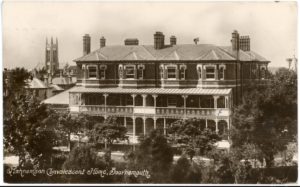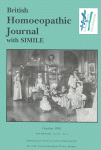 William Theophilus Ord M.R.C.S. L.R.C.P. (9 June 1863 – June 1943) was a British orthodox physician who converted to homeopathy to become Fellow and President of the British Homeopathic Society. Ord was Visiting Surgeon and Physician to the Hahnemann Convalescent Home and Homeopathic Dispensary Bournemouth, and was a Member of the Geological Society of London, and Member of the Dorset Natural History and Archaeological Society .
William Theophilus Ord M.R.C.S. L.R.C.P. (9 June 1863 – June 1943) was a British orthodox physician who converted to homeopathy to become Fellow and President of the British Homeopathic Society. Ord was Visiting Surgeon and Physician to the Hahnemann Convalescent Home and Homeopathic Dispensary Bournemouth, and was a Member of the Geological Society of London, and Member of the Dorset Natural History and Archaeological Society .
Ord was a colleague of Herbert Nankivell, William Clowes Pritchard, David Dyce Brown, Dudley d’Auvergne Wright, among others.
William Theophilus Ord was born in Tormoham (now Torquay), Devon, to Alexander Craven Ord (1824 – 1902) and Annie Clementina Mure (1831 – 1895).
In 1882 Ord won the Martyn Memorial Scholarship to study at Bristol General Hospital. He became a member of the Royal College of Surgeons and a Licentiate of the Royal College of Physicians, London.
Ord was Honorary Medical Officer at the Devon and Exeter Homoeopathic Dispensary
In 1889 Ord married married Elizabeth Louisa Mercer (1860 – 1921). They had two children, Margaret Lois Ord (1891 – ?) and
William Alexander Ord (1896 – 1917).
By 1898 Ord was listed as residing at Greenstead, Madeira Road, Bournemouth East, and at 4 Bank Buildings, Boscombe.
In September 1905 Ord was one of the members who attended the British Homoeopathic Congress meeting in Hastings.
As President of the British Homoeopathic Society, Ord delivered his Presidential address in October, 1910. This was entitled “Homeopathy and the Medicine of To-Day: A Retrospect and an Anticipation.”
In 1942 Ord was living at 17 Howell Road, Exeter.
Ord submitted cases and articles to various homeopathic publications, including Asthma: a vasomotor neurosis, The Dearth of Homeopathic Practitioners, The Early Recognition of Gout and Allied Disorders, Treatment of Pulmonary Phthisis, The Rarer Uses of Some Common Drugs, Urinary Deposits in Gout, Collinsonia Canadensis, Magnesium Phosphoricum as an Anodyne, Treatment During an Attack of Cerebral Gout, The Curability of Phthisis in the light of modern research.



I question his marriage to Catherine Aldridge King. The census show him married to “Elizabeth Louisa” who is probably his first cousin Elizabeth Louisa Mercer. According to the Free BDM marriage index Elizabeth Louisa Mercer and William Theophilus Ord were both married in the 4th quarter of 1889 in Christchurch – a coincidence to good to pass up.
You are right. I have only just come across this but he was married as you say and they had two children, my grandmother and her brother who died in his early twenties
Susan. I am a distant cousin through Alexander Craven Ord. Find me on Ancestry.com. My tree is “Ord of Greensted JuxtaOngar”.
Thank you Vivien and Susan. We have updated W.T. Ord’s marriage details. If you have any additional biographical information and/or photographs of Dr. Ord that you would be willing to share we’d be very glad to hear from you.